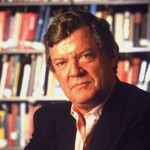Few of the obituary writers for the late, great Robert Hughes have been up to the job of actually summarising and measuring his contribution as a writer, critic and opinionated old bastard. The sniffy, condescending obit in The Guardian was woeful, while the Australian writers in newspapers, magazines and websites are still awe struck post mortem by the great man’s personality. Writing on The New Yorker website, Adam Gopnik provides what is both a clear-eye appraisal and unsentimental remembrance of a friend:
“His values rose not from some distant imagined past, but from the European modernism that still vibrated with excitement in the Australia of his youth, where no one yet knew it well enough to have grown tired of it. Shaped—some might say scarred—by a resolute Jesuit education, Hughes had as a teen-ager drunk in the images and ideas of that faraway modernism without the least touch of complacent familiarity. (Mechanical reproduction heightened, enhanced its value for him.) In the same way that his contemporary Barry Humphries relished the dandy-art of the eighteen-nineties in a way that few Brits could, or that Clive James kept faith in the power of the heroic couplet to communicate, Hughes believed in modern art with something close to innocence. Although “The Shock of the New” is in many ways an account of the tragedy of modernism—the tragedy of Utopias unachieved, historical triumphs made hollow, evasions of market values that ended by serving them—that tragedy is more than set off by the triumph of modern artists. The thesis of “The Shock of the New,” if such a work can be reduced to one, is that what art lost when it could no longer credibly be a mirror of nature it had gained as a transmitter of lived experience, so that, if the surface of the world had been ceded to the photographic image, the essentials of existence—desire in Picasso, physical ecstasy in Matisse, or the agonized alienation in Giacometti, or all of them at once in Van Gogh—could now be expressed with newfound urgency…”
Read more Postscript: Robert Hughes.


Pingback: An eloquent and fitting eulogy | The Good Copy